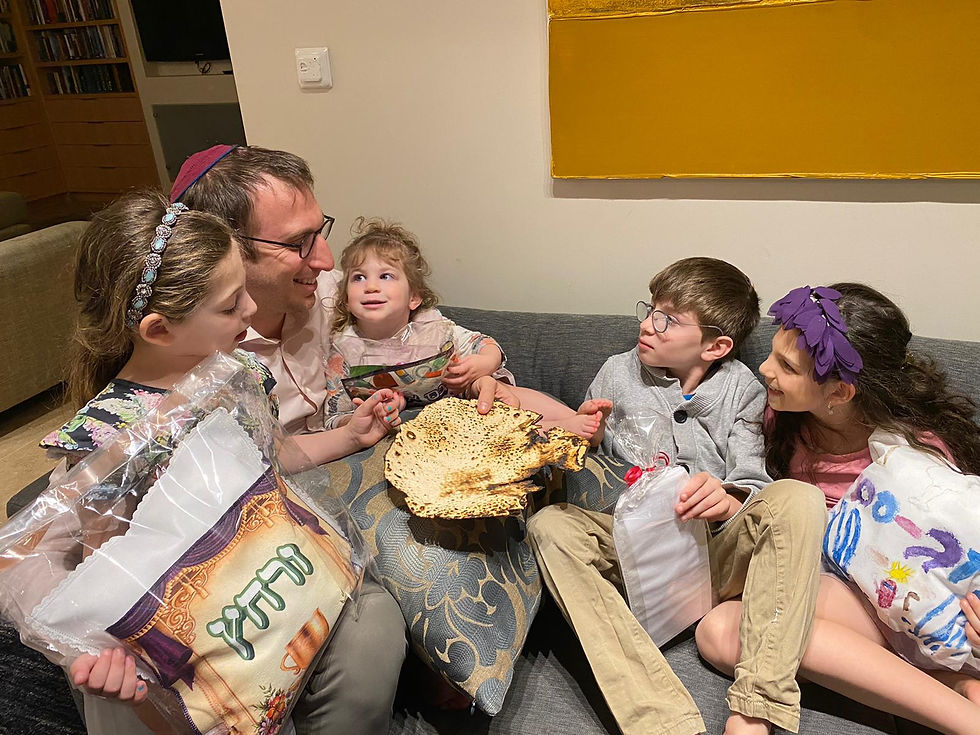"The Empathy of Exodus"
- Rabbi Dr. Benji Levy

- Apr 13, 2022
- 3 min read

(First published in The Jerusalem Post on the 7th of April 2022).
I listened to the radio in horror as Russian aggression continued to pummel civilian
areas and shell humanitarian corridors. As the report phased out, music began with a familiar tune
and John Lennon’s classic words: ‘Imagine there’s no countries, it isn’t hard to do, nothing to kill or
die for and no religions too.’
Pulling down barriers such as gender, race, religion, sexual orientation, nationality, we are living in an age of unprecedented empathy. We force ourselves to look beyond layers and definitions that have torn people apart for millenia and see each other’s humanity. This applies not just to the people in our immediate circles but also to those on the other side of the world. I wonder how this ability to see each other has shaped our view of the current conflict. We cry for the mother’s fleeing their homes. We send hope and courage to soldiers protecting their families. Donations fly in for medical supplies and people volunteer. Some join rallies and others share stories and information to keep us connected and aware of how we can help.
This profound empathy is a curious one. And many argue that we need to break free of our
particular narrative to truly connect to others. I believe, however, that it is within our own stories
that we find what truly connects us. Because we are all in some sense nurturers, warriors and
wanderers.
The Jewish festival of Passover commemorating the Exodus from Egypt is only a few weeks away. It
details the enslavement and torture of a persecuted minority. The holiday evokes images of millions
fleeing with nothing more than what they could carry on their backs into the unknown wilderness.
The instance that inspired the beautiful tunes of African Americans as they demanded, in the same
words of Moses, ‘Let my people go.’ An event that can conjure up parallel images of what we are
seeing on our screens today.
While we are commanded to relive and remember the Exodus, there is no word in ancient Hebrew
for history. The biblical concept of history is not a fixation on the past, but an undertaking, in the
present, to remember for the future. In Jewish thought, history is a verb, not a noun. By reliving the
hardships from whence we come, we can learn to better appreciate the significance of the hardships experienced by others. If what had been does not shift what will be, the act of remembering has not been achieved.
At the special dinner of the first night of Passover, the most celebrated Jewish ritual across the globe,
we heighten our senses on a multi-sensory journey back in time in the here and now. We move from an intellectual subject to visceral memory. We taste the bread of affliction, the bitter herbs of
hardships and dip the hardboiled egg of mourning into the tears of saltwater. We rediscover freedom through the exodus and sing songs of gratitude at these jubilant moments as free people. By putting ourselves in the shoes of our own ancestors and shrinking the distance between us and our past, we take a profound step in closing the gap with others in similar predicaments, cultivating empathy in one of the deepest ways possible.
We do not have to forsake our heritage to connect to others. It is quite the opposite. When we truly
embody our legacy, we realize that everyone has a legacy. The biblical story tells of our origins as
‘strangers in a strange land’ and we are called upon to act: ‘You shall not wrong a stranger or oppress him, for you were strangers in the land of Egypt.’ One of the myths of universalism in its purest form may mean that if everyone escapes their own history, we broaden our humanity. But in essence, through connecting to our distinct stories we can appreciate the stories of others. And when our particular story has universal themes, it has the capacity to inspire all.
So on the night of Passover, my family and I will once again become a band of slaves. The same
slaves that suffered and then the same slave that inverted society, re-wrote the course of history and
became a beacon for countless others. John Lennon’s dream was that ‘the world will be as one.’ But
when the song ended this morning and the presenter mentioned what is happening in Ukraine once
again, my dream was that the world will be big enough for billions. Not by removing differences, but by dignifying diversity.








Strong governance and oversight mechanisms are in place at Titan Research Group. Internal audits, review boards, and quality https://titanresearch.ca/ assurance processes ensure that research activities meet high standards and comply with applicable regulations.